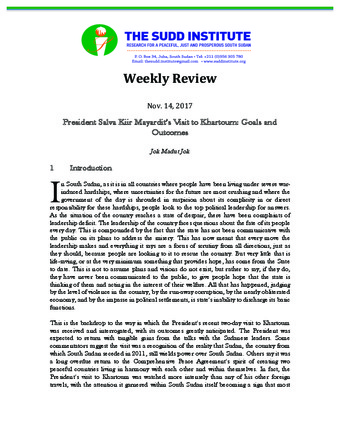President Salva Kiir Mayardit’s Visit to Khartoum: Goals and Outcomes
Publication Summary
People who study the relationship between north and south of the old Sudan do recognize that the memories of the Sudanese state violence, racial and religious bigotry of many northern Sudanese leaders and the anti-north sentiments they have engendered in the south, all of which fueled the drive for the South’s separation, remain the lens through which these relations are seen by many South Sudanese today. But to the extent that anyone can remember the old Sudanese adage, that “no one chooses their neighbor,” these observers have often talked about the fact that none of the two countries can wish away the existence of the other, that there is a need to help the two countries to overcome their historical acrimonies, distrust and bad faith negotiation that has always characterized their relationship, and to move into a new era of mutual recognition and respect, so that, together they may create two viable and neighborly countries, peaceful within and between each other. It was with this mutual connection in mind that President Kiir’s visit was the focus of attention from within South Sudan, as well as in the region and beyond. This weekly review provides a comment on President Kiir’s visit, what its aims were and what it accomplished. It reviews the reactions of the South Sudanese, particularly to what President Kiir said in his meeting with Sudan’s leader, Omer Hassan al-Bashir. The visit, its perceived significance or lack thereof, were widely debated in South Sudan, in the media, and in discussion forums.
Jok Madut Jok is trained in the anthropology of health and holds a Ph.D. from the University of California, Los Angeles (UCLA). He is a fellow of Rift Valley Institute and Director of the Sudd Institute. Jok has held fellowship positions at a number of other institutions, including the United States Institute of Peace and the Woodrow Wilson International Center for Scholars. He also served in the Government of South Sudan as undersecretary in the Ministry of Culture and Heritage for three years. He has also worked in aid and development and author of four books and numerous articles covering gender, sexuality and reproductive health, humanitarian aid, ethnography of political violence, gender-based violence, war and slavery, and the politics of identity in South Sudan and Sudan. His book Breaking Sudan: The Search for Peace, was published in 2017 by OneWorld.

